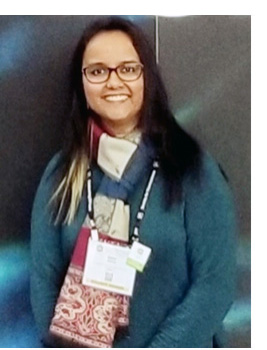The EEGLAB News #15
Deepa Gupta, Ph.D.
Postdoctoral Scholar, Swartz Center for Computational Neuroscience (SCCN), UC San Diego

Recently arrived Postdoctoral Scholar and workshop volunteer Deepa Gupta, Ph.D., is analyzing children’s electroencephalography (EEG) data in response to watching a movie. After receiving her Ph.D. from the University of Maryland Baltimore County (UMBC), she was selected as a Postdoc Scholar at the Swartz Center for Computational Neuroscience (SCCN). Upon learning that she would be working side by side with some of the original developers of EEGLAB (Drs. Makeig, Jung, and Delorme), Dr. Gupta was elated. “I feel honored to work with these great researchers who are creating powerful toolboxes.”
Dr. Gupta is quick to sing praises of EEGLAB. She recalls her earlier years in the field, before she found out about the powerful EEGLAB toolbox. “At UMBC, I started working with long excel sheets that took hours to load,” she recalls. When she found EEGLAB in 2015, and learned about MATLAB-based EEGLAB importable files and how much time they saved, she was thrilled. “What took hours in Excel took a matter of seconds in EEGLAB! I set out to learn more about EEGLAB-based processing techniques, tools, documentation and guidelines, which opened a window for my professor and me to invest further in EEG signal processing projects.”
She attended her first EEGLAB Workshop in 2018, and has since learned much more about EEGLAB plug-ins and features. “I now use Independent Component Analysis (Makeig et al 1995), plug-ins that include Brain Imaging Data Structure (BIDS), Hierarchical Event Descriptors (HED) (developed by Dr. Kay Robbins), Neuroelectromagnetic Forward Head Modeling Toolbox (NFT) (Acar & Makeig, 2010), and Source Information Flow Toolbox (SIFT) (Tim Mullen). Dr. Gupta shares. “I really love the fact that everybody here works together on a team in a respectful manner with each other, with so much energy and such amazing zest for all these features and EEG analysis.” Dr. Gupta’s confidence grew as she learned more about the source localization process, it’s strengths and limits, and what mistakes to avoid while using EEGLAB. “I was able to bring in more results with more confidence,” she remarks happily. “I knew that now I was really on the right track.” So much so, that she is now eager to share some ideas of her own: “I am discussing my ideas with Dr. Makeig, Dr. Delorme, and Dr. Jung to introduce more features that I think will be useful – such as how to improve event data descriptions and more.”
Dr. Gupta has traveled far to get where she is – starting at the Jaypee Institute of Information Technology in India (2009), followed by the University of Florida (M.S. in Computer Engineering, 2010), and recently the UMBC (Ph.D. in Computer Engineering, 2022 – thesis: “Brain connectivity biomarker characterization by using EEG and TMS techniques”). For the first two weeks at SCCN, Dr. Gupta was reeling with excitement, thinking, “Wow, I’m working with these amazing researchers. I’m seeing them in real life and not just on-screen like YouTube!” She pauses, then continues, “Now, it’s settling in, and I am realizing the responsibility here. I am determined to give my best. I see the hard-working students at this workshop who were just like me as a participant, years ago in 2018, when I first came to learn the toolbox. It’s very important, I think, that the EEGLAB toolbox is used correctly with the data and that it comes across to all of us students and EEG enthusiasts.”
She continues, “I work hard, and I’m grateful to have these people to work with. The pandemic was difficult, but the great people here gave me the boost I really needed.” After a pause, she concludes, “For everyone, something drives them. The research to find therapeutic ways of healing from mental health ailments and uncovering underlying brain mechanisms for aiding neurosurgeons and clinicians in medical applications – that's what drives me.”
R. Weistrop, March 2023